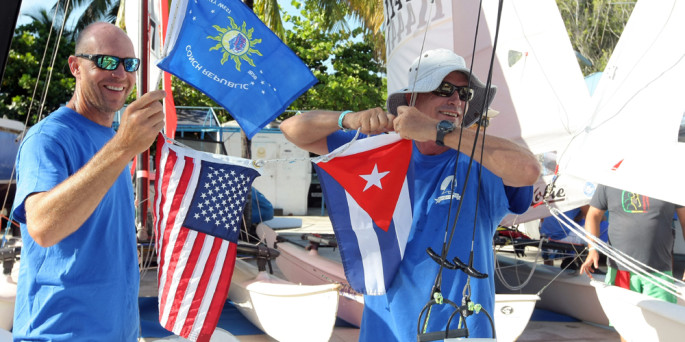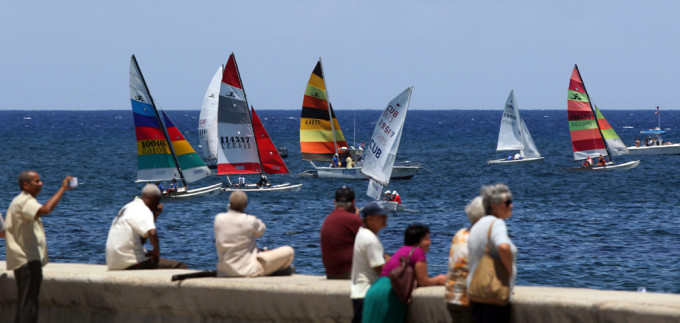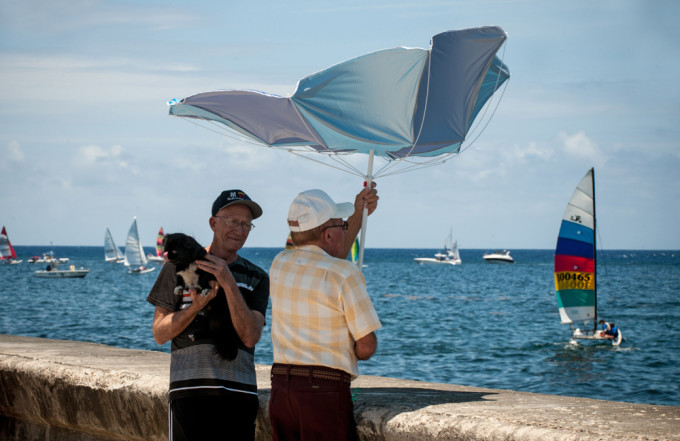
Diplomacy and regattas
HAVANA — As I write these lines, I can’t help remembering that game I used to play with my wife and children when we traveled to the beach. “To Havana has come a ship loaded with…” One of us chose a letter and others had to come up — very quickly — with words that began with that letter.
Now, from the Malecón, I watch U.S. and Cuban sailboats in the harbor. The other day, I saw two caravels with a crew of Americans. My recollection turned into a question: What are those ships loaded with?
I sincerely believe that they’re loaded with good will. They’re looking for a rapprochement, they underscore what seems to be filling the hearts of both peoples. So close and yet so distant. That relationship has been a monument to stuborness and prepotency, to the ability to resist, demonstrated by a nation when the Berlin Wall fell and — in the worst solitude, when the country hit bottom and many lost confidence in political doctrines — we Cubans clung to the essentials: our nation and the will not to be overwhelmed by penuries and shortages.
Again I look at the ships on the sea, with their colorful sails, or the caravels flying two flags as a symbol that it is still possible — without abandoning our identities — to navigate in politics to end more than half a century of war, a war waged with rifles and bombs, economic and financial pressures, and a media distortion aimed at heating up the pressure cooker so the society could explode.

CUBA EEUU
But, and I stress this, a pragmatic approach has begun, indispensable not only to seek new paths that will influence our reality — every relationship seeks to influence, the question being “how” and “what for” — but also more in tune with the generalized opinion of the American people and (why not?) the Cuban citizens who live on this island and those who live abroad.
So, the regattas and the caravels could be seen as a part of a perfect timetable, since their appearance coincides with the fourth round of diplomatic negotiations to be held today (May 21) in Washington by the official delegations of both governments.
Continuing with the theory of simultaneous boat shows and talks, in precise synchrony, we learn that — finally! — a bank has offered to serve the needs of the Cuban Interests Office in Washington.
The office’s operations had been seriously hindered by the inclusion of Cuba on the list of countries that sponsor terrorism, whereby European banks have had to pay fines to the U.S. in astronomical figures. Such was the case of the French bank that last year was penalized with an $8 billion fine.
The word “embargo” still navigates in official statements and the media, but at least there is a bank that serves the Cuban representatives.
Obviously, Washington has given sufficient guarantees to the Stonegate Bank in Florida to allow it to open the accounts of the Cuban Interests Section and the Cuban delegation to the United Nations.
Havana has opted for silence. Perhaps it will speak soon and confirm the news. The banking issue was one of the hot spots at the bilateral talks because it hampered the operations of the Cuban delegations, as it would have bedeviled any other diplomatic office.
Another consideration: Mrs. Roberta Jacobson, Assistant Secretary of State for Hemisphere Affairs, told the media that the future U.S. Embassy in Cuba should “function more like other diplomatic missions in Cuba,” in a clear reference to certain activities carried out by other missions on the island.
This issue, along with the accredited diplomats’ freedom to travel, restricted by both countries for years, and the issue of the bank (already settled) constitute the two most problematic issues in the conversations.

SAILING-CUBA-HAVANA CHALLENGE REGATTA
To avoid this shoal we might turn to the international rules for the activities of diplomatic offices in any other country. The solution could be found — must be found — in those regulations of worldwide application. How difficult can it be for both parties to observe them?
We should heed the words of Steve Keng, of the Key West Nautical Club, who, referring to the dialogue that has opened between Cuba and the U.S. and is about to continue, told the EFE news agency: “I believe that this is the moment. It’s a regatta of friendship. In fact, the trophy is called Trophy of Friendship. No matter who wins.”
I heed his words and place them on the reader’s “sails.” It’s not a question of who beats who. Victory is not defeating someone or something. Victory is achieving one’s goals, which in this case is to the benefit of both nations.
(Photos: La Máquina Digital)

